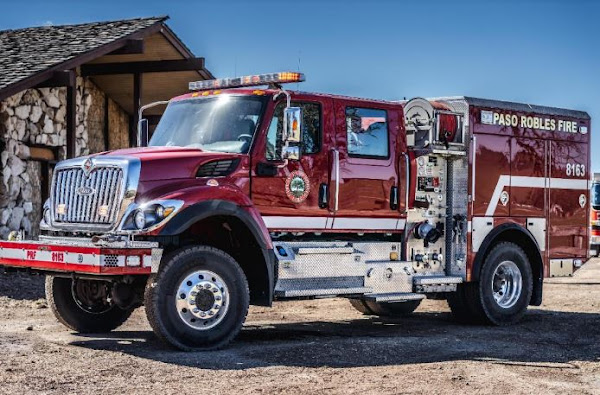PASO ROBLES, CA – Paso Robles Fire and Emergency Services recently took delivery of its first Type III fire engine in the department’s history. The Paso Robles City Council approved the purchase of the fire apparatus built by Pierce Manufacturing INC. on February 16, 2021. The engine was placed in service for emergency response on Feb. 19, 2022. This specialized fire engine is designed to respond to wildland fires that pose a risk to the community of Paso Robles and across the State of California. In 2021, Paso Robles Fire and Emergency Services responded to 144 wildland fires. The 4x4 fire engine can access areas with difficult terrain and is equipped with specialized equipment for combatting wildland fires. Due to the drought conditions we have experienced over the last few years, wildfires locally and throughout the state are accelerating at unprecedented rates. The rapid growth of these wildfires is even stunning many of us that have been doing this for a very long time. The addition of this specialized apparatus to augment our response capabilities is a significant milestone in serving our community,” said Chief Stornetta. The engine is also well equipped and prepared for other types of emergency responses including Medical Aids, Structure Fires, and Vehicle Accidents. On Monday Feb. 21, 2022, the engine was dispatched to a vegetation fire off North River Rd. with difficult access. Due to the 4x4 capabilities, the crews were able to safely access and extinguish the fire. On Tuesday morning, Feb. 22 the engine was dispatched to a second vegetation fire in the Salinas Riverbed.
Fatal 3 Vehicle Accident Involving Wrong Way Driver on Highway 101 Outside of King City on January 10
A fatal multi-vehicle collision happened on Saturday night, January 10 at 9:51 p.m. on northbound Highway 101 outside of King City. According to the King City CHP a 2016 Toyota Tacoma driven by 65-year-old Paul Lee Cooper of Otis, Oregon was heading the wrong way going southbound in the northbound lanes south of Jolon Road, while a 2006 Toyota Corolla driven by 33-year-old Dinora Maribel Gomez of Salinas was heading northbound on Highway 101 south of Jolon Road in the #1 lane and a Honda Accord driven by 36-year-old Ignacio Sangerman of King City was also traveling northbound on Highway 101 south of Jolon Road but was in the #2 lane. Due to Cooper's level of impairment his vehicle went the wrong way on Highway 101 going directly into the path of Gomez' vehicle causing the rear of her car to crash with the front of the vehicle driven by Sangerman. Cooper was arrested, sustaining major injuries and was transported to Natividad Medical Center in Salinas where as of January 12 is...

Comments
Post a Comment